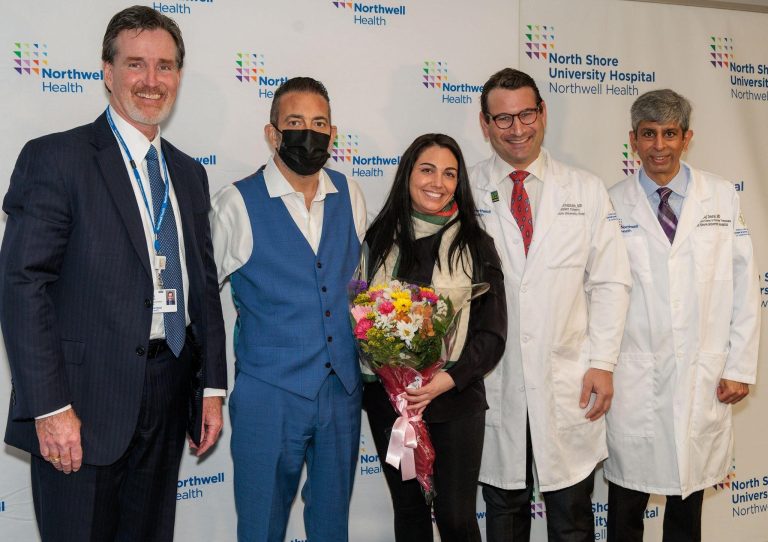
By Jesse Fraga
After over five months on dialysis and kidneys the size of footballs, a 52-year-old father from Mineola received a life-saving gift from his daughter.
Dr. Elliot Grodstein and Dr. Aaron Winnick, surgeons at North Shore University Hospital in Manhasset, performed a successful kidney transplant, or bilateral nephrectomy, on Jan. 8, to treat Matthew Carlson’s rare polycystic kidney disease.
The disease causes the organ to degenerate into, “huge balls of cysts until there is no kidney tissue left,” Grodstein said in a press release.
Only about 10 of over 200 kidney transplants each year at Northwell Health are related to the disorder, according to the press release. Around 600,000 Americans live with it.
“Polycystic kidney disease is a death sentence that I overcame because of my daughter Stephanie [Trotti],” Carlson said, holding up an image of his diseased kidneys at a press conference in the hospital Tuesday morning.
Carlson, a general manager of Rallye BMW dealership, witnessed his mother succumb to the disease in 2015, around the time he began to feel its effects. He had a 50% chance of inheriting the disease.
Over time, he noticed his stomach protruding, and an inability to retain water. Each kidney grew to three-and-a-half pounds and pushed from his lower back toward his belly.
That’s when I knew that things were getting bad,” he said at the conference. “I had two footballs that were inside of me.”
Trotti’s surgery was less difficult than her father’s. While Carlson is still in recovery, his creatinine, or measure of kidney function, is “almost normal,” Grodstein said. Kidneys of living donors usually last longer than those of deceased donors, he added.
“It’s actually just a miracle in itself that my father raised me and I could give back,” Trotti, 34, said. “Post surgery, it’s wonderful. I am back to normal, I’m back to my regular routine.”
The mother of three children encouraged others to consider her “selfless act,” by donating to those in need of organs, even if they aren’t a perfect match.
“They’re walking around, ‘Mommy’s a hero,’ which makes me feel great, but… unfortunately, I saw my father go through that,” said Trotti, who lives in Holbrook. “I would love for more people to understand that there are people out there that are suffering on dialysis every day.”
Grodstein called dialysis a “ticking time bomb,” noting that most patients with polycystic kidney disease die before receiving a transplant. He recommends others research Donate Life New York State to learn about how to become an organ donor.
“[Carlson] has a new opportunity to get together for family reunions, parties, and all the good parts of life, and that’s really thanks to his wonderful daughter,” Grodstein said. “The most important thing is to have somebody step forward on your behalf.”






